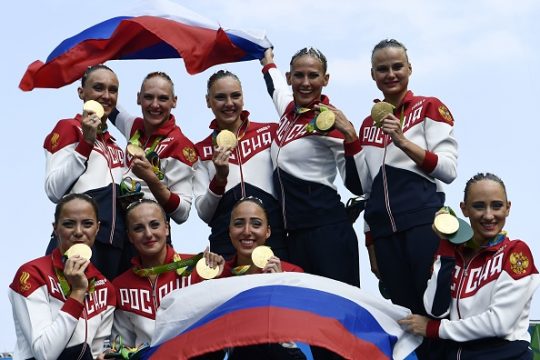The International Olympic Committee (IOC) announced Tuesday that the Russian Federation will be banned from the 2018 Winter Olympic Games in Pyeongchang, South Korea.
The unprecedented action comes after an IOC investigation confirmed reports of Russia’s extensive use of doping in international competitions, including during the 2014 Winter Games in Sochi, Russia, the New York Times reports. The IOC was hesitant to punish Russia in 2016 for systematic doping discovered by the World Anti-Doping Agency (WADA), but IOC President Thomas Bach said the organization seeks to draw a clear line this time.
"This was an unprecedented attack on the integrity of the Olympic Games and sport," Bach said. "This should draw a line under this damaging episode and serve as a catalyst for a more effective anti-doping system."
The decision bars the Russian Olympic team from competition and even prevents Russian officials from attending the games; although, Russia's Olympic Committee will likely appeal the decision. Under the current parameters, athletes from Russia can only petition for permission to compete if they have a history of rigorous drug-testing, and even then, they would have to compete independently and wear a neutral uniform.
If a Russian who obtains a special dispensation to compete does earn a gold medal, the Russian flag will not be raised, its anthem will not be played, and the record books will show Russia as having won zero medals during the 2018 games.
The news broke late in the evening in Russia, likely preventing an immediate Russian statement in response. Before the decision was handed down, Russian Sports Minister Vitaly Smirnov appealed to the IOC to help Russia rather than punish it.
"Everyone is talking about how to punish Russia, but no one is talking about how to help Russia," Smirnov said Tuesday.
The IOC is also rescinding medals from the 2014 Sochi games as it discovers proof of wrongdoing, and it plans to hold new ceremonies for athletes cheated out of medals by Russian wrongdoing. Some medals have already been rescinded and the IOC plans to continue investigating.
Russia’s doping program involved over 1,000 athletes, and it was run by the country’s so-called anti-doping agency, Rusada. It involved use of a wide range of performance-enhancing drugs and systematically faking drug tests, which catapulted the Russian team to a record-breaking team performance in the 2014 Winter Games in Sochi, Russia.
Thomas Bach, president of IOC, has said he was perturbed not only by Russia’s widespread cheating but by how it had been accomplished: by corrupting the Olympic laboratory that handled drug testing at the Games, and on orders from Russia’s own Olympic officials.
In an elaborate overnight operation at the 2014 Sochi Games, a team assembled by Russia’s sports ministry tampered with more than 100 urine samples to conceal evidence of top athletes’ steroid use throughout the course of competition. More than two dozen Russian athletes have been disqualified from the Sochi standings as a result, and Olympic officials are still sorting through the tainted results and rescinding medals.
As part of the IOC's investigation, some on the inside became witnesses to the corruption within Rusada. The agency was overseen by then-sports minister Vitaly Mutko, who is now the Russian Deputy Prime Minister. Chemist Grigory Rodchenkov and former Rusada employee Vitaly Stepanov have spoken publicly about the institutionalized nature of Russian cheating, which extended across various sports. Both witnesses now reside in the United States.
"The world knows that hundreds of Olympic dreams have been stolen by the doping system in the country where I was born," Stepanov wrote in an affidavit he submitted to the IOC.
As part of Tuesday’s ruling, Mutko was barred for life from the Olympics.
The 17-month investigation was conducted by former Swiss President Samuel Schmid, and he delivered his findings in a report to an IOC panel, which then made the decision.
